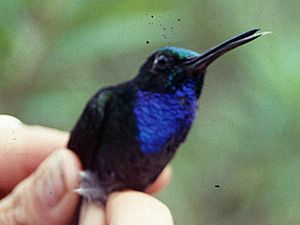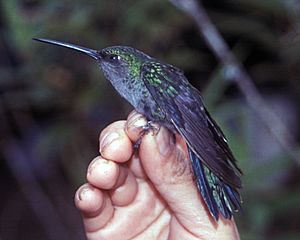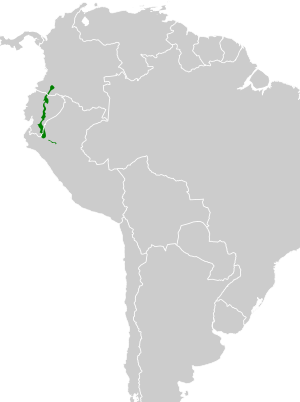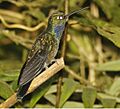Napo sabrewing facts for kids
Quick facts for kids Napo sabrewing |
|
|---|---|
 |
|
 |
|
| male (above) and female (below) | |
| Conservation status | |
| Scientific classification |
|
| Kingdom: | Animalia |
| Phylum: | Chordata |
| Class: | Aves |
| Order: | Apodiformes |
| Family: | Trochilidae |
| Genus: | Campylopterus |
| Species: |
C. villaviscensio
|
| Binomial name | |
| Campylopterus villaviscensio Bourcier, 1851
|
|
 |
|
| Script error: The function "autoWithCaption" does not exist. | |
Script error: No such module "Check for conflicting parameters".
The Napo sabrewing (Campylopterus villaviscensio) is a type of hummingbird that is considered Near Threatened. This means its population might be at risk in the future. You can find this beautiful bird in countries like Colombia, Ecuador, and Peru.
Contents
About the Napo Sabrewing's Family
The Napo sabrewing is a special bird because it is monotypic. This means it's the only species in its particular group or genus called Campylopterus. It doesn't have any close relatives that are also considered sabrewings.
What the Napo Sabrewing Looks Like
The Napo sabrewing is about 13.5 centimeters (5.3 inches) long. Male birds are a bit heavier, weighing between 7.4 to 9.3 grams (0.26 to 0.33 ounces). Females are lighter, weighing 5.2 to 7.4 grams (0.18 to 0.26 ounces).
Both male and female Napo sabrewings have a straight black beak. They also have a small white spot right behind their eye.
- Male Napo Sabrewing: The male's head is a shiny golden green. The rest of its back and upper parts are a bronzy green color. Its throat and chest are a dark violet-blue. The rest of its belly and underparts are dark gray with green spots. The feathers in the middle of its tail are bronze-green, and the other tail feathers are dark blue.
- Female Napo Sabrewing: Females have bright emerald green upper parts. Their underparts are gray. Their tail is blue-green, and the tips of the feathers are whitish gray.
Where the Napo Sabrewing Lives
The Napo sabrewing lives in South America. You can find it in:
- Southern Colombia
- Eastern Ecuador
- Northeastern Peru, as far south as the San Martín Department
This hummingbird likes to live in humid mountain forests. It also lives in cloud forests and forests that have grown back after being cut down. They usually live at high elevations, mostly between 1,000 and 1,800 meters (3,300 to 5,900 feet) above sea level. Sometimes, in southern Colombia, they can be found as low as 780 meters (2,560 feet).
Napo Sabrewing Behavior
How They Move
Scientists don't know much about how the Napo sabrewing moves around. It's not clear if they migrate or stay in the same area all year.
What They Eat
The Napo sabrewing looks for food from the lower parts of the forest up to the middle levels.
- They drink nectar from flowers.
- They also eat small insects. They catch insects by flying out from a perch to grab them in the air.
We don't know many specific details about their diet.
Reproduction and Life Cycle
Napo sabrewings have been seen ready to breed in October and November. However, not much else is known about how they reproduce or their breeding habits.
Their Calls and Songs
The Napo sabrewing has a unique song. It's a long series of two notes that repeat over and over. It sounds like "tslip...tseek...tslip...tseek..." or "trrip...tseek...trrip...tseek."
Their calls include:
- A single "chip" sound.
- A doubled "chirrip" sound.
Sometimes, these calls can turn into a short rattling noise.
Napo Sabrewing's Conservation Status
The IUCN (International Union for Conservation of Nature) has listed the Napo sabrewing as Near Threatened. This means that while it's not in immediate danger, its population could become threatened in the near future.
- It lives in a "moderately small" area.
- Scientists believe its population number is decreasing, but they don't know exactly how many there are.
The main reasons this bird is at risk are:
- Mining: Digging for minerals can destroy their habitat.
- Logging: Cutting down trees for wood removes their homes.
- Agriculture: Forests are being cleared to make space for farms and pastures.
Images for kids
See also
 In Spanish: Colibrí del Napo para niños
In Spanish: Colibrí del Napo para niños
 | Dorothy Vaughan |
 | Charles Henry Turner |
 | Hildrus Poindexter |
 | Henry Cecil McBay |



